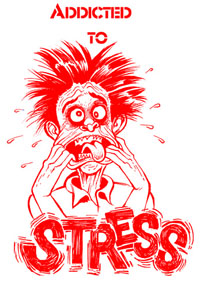|
Super Joy Thinking: Living hard and fast and then crashing and burning out is accompanied by massive psychochemical changes in our bodies. We can mistake being high or being depressed as the only intense emotional states. Being joyful is different than being “high.” Being joyful is being intensely peaceful, no matter how we are behaving externally.
“I flourish on stress.” “I’m at my best when I’m under stress.” “Stress motivates me.” These statements are common, and they reveal the major misunderstanding about joy in our society. The human joy response is not the stress or depression response, it is a unique healing, healthy human response of profound comfort with who we are, where we are, and the satisfaction and even celebration of being human.

My own research indicates that people are capable of running very “hot” and “cold” in terms of their psychochemical porridge.
Hot people are prone to what is called maladaptive hyper arousal, with the body going into hormonal overdrive at the slightest provocation. When we are running cold, we are characterized by a learned helplessness, a bathing of the body in the equally damaging cold psychochemical porridge of the brain’s surrender to what it sees as a hopeless situation. We can all run hot and cold at various times of the day and for long periods of time in our lives.
The joy response is a balance of these hot and cold psychochemicals, a time when the body systems are in almost perfect harmony.
We can bring about this balance by thinking in less stressful or depressed ways, by not getting in joy’s way.
To admit your stress and/or depression addiction, you must do three things. First, examine your daily emotional style. Are you high, low, or in transition between these two states much of the time? Are you hyper reactive to events at work or at home, with your emotional style dictated by these events or your ruminations about them? Second, acknowledge that being happy or sad can be responses to stress addiction, either happy with the stress or sad with the letdown or aftermath of the stress response. Finally, assess your overall health. Do not look just for major symptoms but also for the Ahab illnesses such as allergies, colds, headaches, fatigue, indigestion, bowel problems, minor infections, and nausea. When you learn the joy response, your general health improves significantly, and you rise refreshed in the morning and fall almost immediately into a restful sleep at night.
In curing any addiction, the most difficult step is acknowledging the existence of the addiction itself. Take that step for yourself, and you are on the way to a healthier, more joyful life.
“Getting High On Stress And Depression vs. Admitting That You Are A Stress/Depression Addict” is an extract from Super Joy, the New York Times bestseller by Paul Pearsall, Ph.D, now available in paperback from Amazon and other bookstores, and on Kindle, Nook, and iTunes.
http://whitecrowbooks.com/books/page/super_joy
Paperback Kindle
|